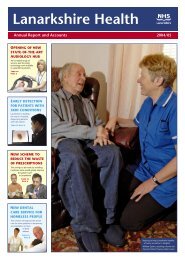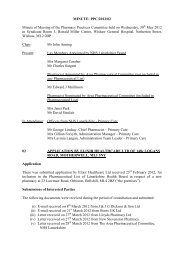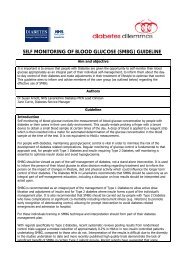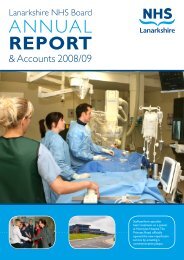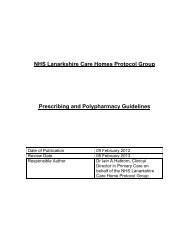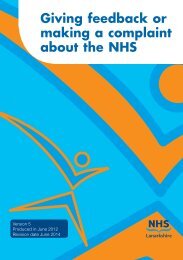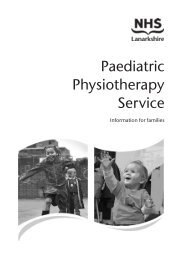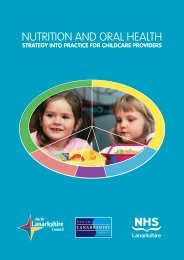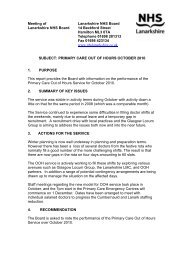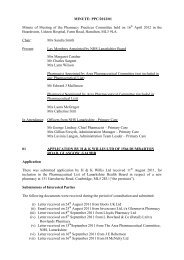Oral Health - NHS Lanarkshire
Oral Health - NHS Lanarkshire
Oral Health - NHS Lanarkshire
You also want an ePaper? Increase the reach of your titles
YUMPU automatically turns print PDFs into web optimized ePapers that Google loves.
4.2 Improving <strong>Oral</strong> <strong>Health</strong> in PrisonsPrisoners are vulnerable to poor oralhealth. They experience more decayedbut fewer filled teeth than the generalScottish population and severe toothdecay is four times more likely in themale prison population. 1 The underlyingcauses of poor oral health such asdeprivation, tobacco, alcohol and druguse, and poor oral hygiene routines arefound in high prevalence within theprison population. 1<strong>Oral</strong> health improvementprogramme in HMP ShottsThe Scottish Executive publication AnAction Plan for Improving <strong>Oral</strong> <strong>Health</strong>and Modernising <strong>NHS</strong> Dental Services inScotland identified improving prisoneroral health as a priority for <strong>NHS</strong> boards. 2Improving the oral health of vulnerablegroups, such as prisoners, continuesto be of importance to the ScottishGovernment. 3<strong>NHS</strong> <strong>Lanarkshire</strong> and HMP Shottsdeveloped a three-year oral healthimprovement programme. This wasdesigned to pilot a whole settingsapproach to improve the oral healthof staff, prisoners and families withinHMP Shotts. The programme aimed tocreate a healthier environment withinthe prison, developing policies whichpromote good oral health as well asproviding health education. Workshopsand activities supported particularinitiatives such as ‘mouth cancer actionmonth’. Further opportunities foreducation were provided during fatherand child visits, for examplethrough growing fruit and vegetables.EvaluationThe effectiveness of the programmein improving knowledge, changingbehaviours, and in creating anenvironment supportive of healthpromotion was evaluated. Fifty-eightprisoners with most involvement in theproject (the intervention group) and49 prisoners with little involvement(the comparison group) completedquestionnaires. Fourteen prisoners and28 members of staff were interviewedabout the experience.As seen in Table 4.2.1, prisoners inthe intervention group showed betterTable 4.2.1 Prisoners’ awareness of oral health messages<strong>Oral</strong> health messagesInterventiongroupComparisongroupCutting down on sugar and sugary drinks** 82% 57%Cleaning teeth regularly with a toothbrush and 91% 77%toothpaste*Using fluoride toothpaste* 68% 45%Using mouthwash* 77% 57%That smoking can cause mouth cancer* 79% 57%Getting a check-up at the dentist every 6 months** 63% 28%Renewing your toothbrush every 3 months* 68% 47%Cleaning false teeth 70% 32%Leaving false teeth out at night 25% 16%* and ** denote differences significant at 5% and 1% respectively<strong>Oral</strong> <strong>Health</strong>41
knowledge of oral health messages.However, this did not appear to changeoral health behaviours. For example,91% of the intervention group knewthey should be brushing with toothpasteregularly but only 83% reported actuallydoing so.Interviews with prison staff suggest thatproviding health education activitiesduring father-child visits is a good wayof improving knowledge. This wasdescribed by one interviewee: ‘I think it’sa clever approach ... Whilst their fatheras parent educator is involved in theprocess, they must be observing some ofthe messages themselves’.The interviews also highlight thedifficulty in changing the prisonenvironment. The barriers to influencingdiet within the prison were highlightedin one interview: ‘It’s hard to break theculture ... A lot of cultural aspects ofliving in a prison as a prisoner involvethose types of commodities [sweetsand fizzy juice] as barter’. This mayhelp explain the limited success ofthe programme in changing behaviourto date.Key Points• An oral health improvement programme was developed in HMP Shotts inpartnership with prison authorities.• The programme increased prisoner knowledge but did not lead to changes inbehaviour.• Involving prisoners in the provision of health information to their familyincreases engagement in health improvement activities.Priorities for Action• Initiatives that influence prison environment and culture should be prioritisedto help change behaviour.• Learning gained from this programme should help shape future healthimprovement programmes with prisoners.References1 Jones CM, McCann M, Nugent Z. Scottish Prisons’ Dental <strong>Health</strong> Survey 2002. Edinburgh: ScottishExecutive, 2004.2 Scottish Executive. An Action Plan for Improving <strong>Oral</strong> <strong>Health</strong> and Modernising <strong>NHS</strong> Dental Services inScotland. Edinburgh: Scottish Executive, 2005.3 Scottish Government. Equally Well: Report of the Ministerial Task Force on <strong>Health</strong> Inequalities.Edinburgh: Scottish Government, 2008.Celia WattSenior <strong>Health</strong> Promotion Officer (<strong>Oral</strong> <strong>Health</strong>)Email: celia.watt@lanarkshire.scot.nhs.ukTelephone: 01698 37762542 Public <strong>Health</strong> 2010 /11



